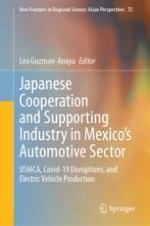This pioneering work focuses on the crucial role that the cooperation of Japan, a major stakeholder in production networks in North America, is playing in supporting Mexico's domestic suppliers of the automotive industry. The importance of Japanese cooperation is analyzed with an examination of the transfer of knowledge and technology crucial for reshaping the automotive industry. Additionally, particular interest is given to the challenges posed to Mexico's automotive industry by the United States–Mexico–Canada Agreement (USMCA), the Covid-19 disruptions, and the transition to electric vehicle (EV) manufacturing. The book demonstrates the importance of cooperation in economic partnership agreements such as the one between Japan and Mexico to strengthen the role of investment in complex regional integration networks and to face new challenges. Academics and policymakers will find a framework to guide research and decision-making regarding the transformation of automotive manufacturing and production networks in Mexico's automotive industry. Specifically, the new conditions facing small and medium-sized enterprises (SMEs) and the important part that Japanese cooperation will play in the industry's evolution.
